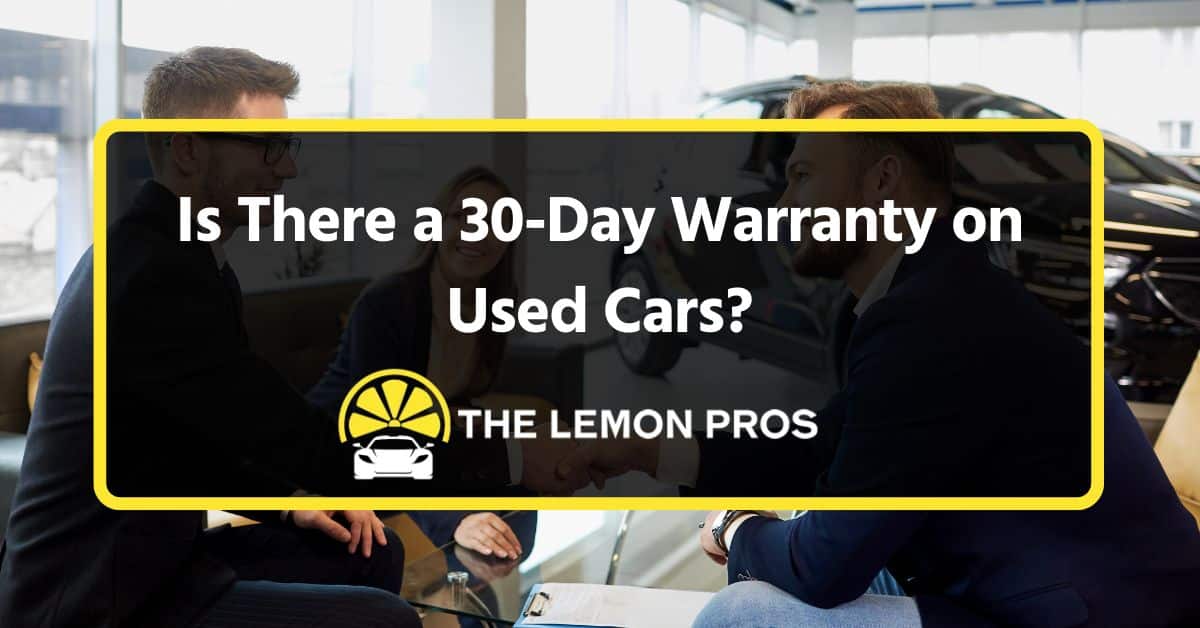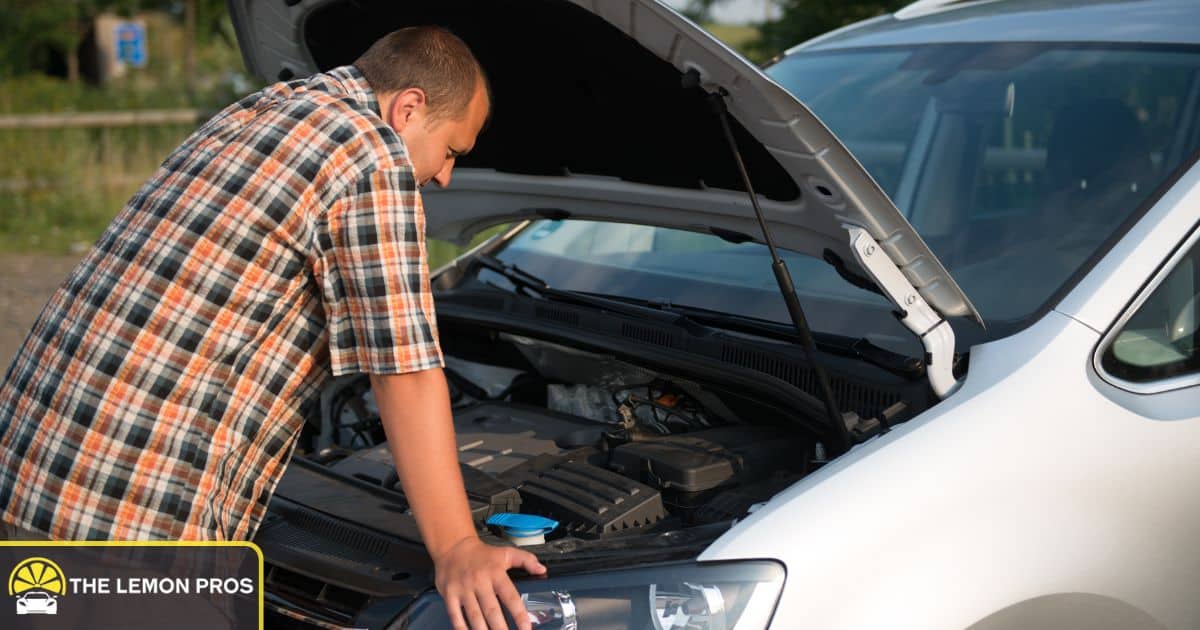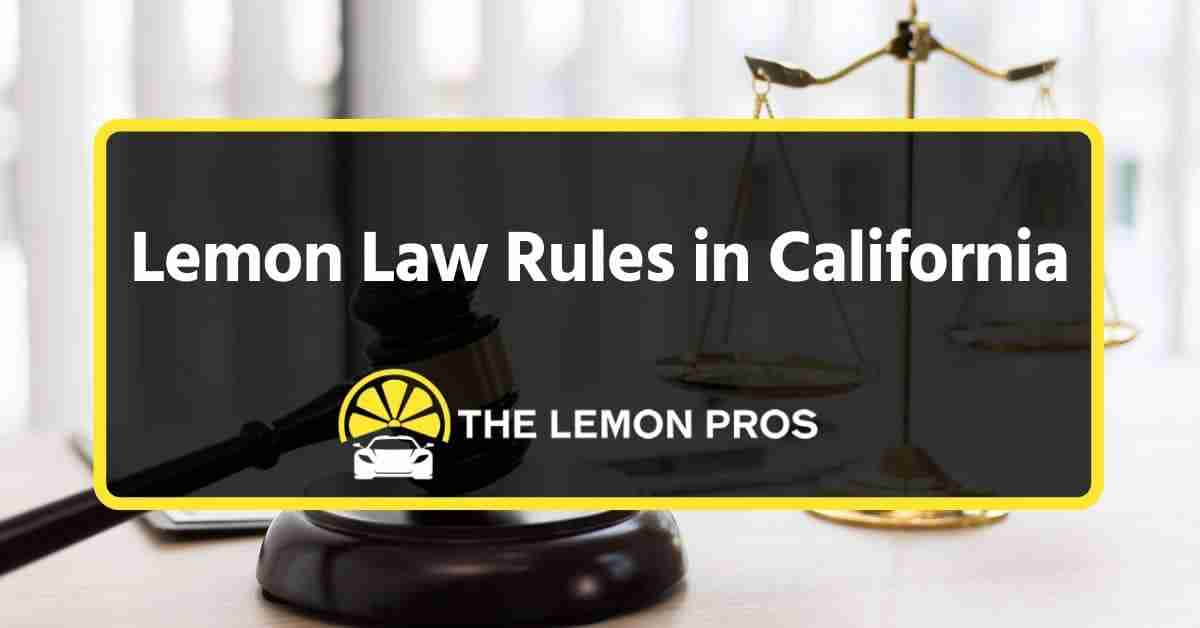
Is There a 30-Day Warranty on Used Cars?
When you purchase a new car, you expect a robust warranty to protect the investment, but the same may not be true when buying a used vehicle. It’s critical to understand the warranty terms with any car you buy, especially if you later need to file a Lemon law claim.
While some dealers will offer a warranty with the used car purchase, there’s no guarantee of getting protection. You always have the option to buy extended warranties for your own coverage and to prevent hefty repair bills.
The Lemon Pros are available to help with warranty disputes and Lemon law claims in California. With our practice area focused on defective vehicles and lawsuits against dealerships, we’ve been able to secure compensation for nearly all of our clients. Contact us today for your free consultation.
In this post, we will answer the question, is there a 30 day warranty on used cars? We will also look at the vehicle warranty law in California and show you what to do if the used car you purchased turned out to be a lemon.
Table Of Contents
What Is a 30-Day Vehicle Warranty Law on Used Cars?

Depending on where you purchase your vehicle, there are several forms of car warranties available:
Buy Here, Pay Here warranty: Since 2013, California has required all Buy Here, Pay Here dealerships to provide a minimum 30-day/1,000 mile warranty. This warranty must cover all essential components, such as the steering, transmission, engine and brakes.
Manufacturer warranty: Covers the car (bumper-to-bumper) from the time it was new for a specified term (typically 36,000 miles or 36 months). These warranties remain with the car even if it's resold, as the Certified Pre-Owned Vehicle. This warranty is valid for all non-consumable components.
Implied warranty: California law includes implied warranties, assuring that the vehicle is fit for ordinary purposes. With used cars, the implied warranty is valid for no less than 60 days, but the dealer can sell the vehicle “as is” which would waive these warranties.
Because of how warranty protections vary, it’s best to review all guarantees made during car sales to ensure you understand what you are agreeing to.
Is a 30-Day Warranty Required by Law on Car Sales?
While every state has differing laws, there are federal protections in place to protect consumers. The Magnuson Moss Warranty Act is the main federal law to familiarize yourself with. It ensures that consumers can receive compensation if the vehicle is defective while under warranty.
In California, there’s also the Lemon Law, known as the Song Beverly Consumer Warranty Act. While the law doesn’t require a 30-day warranty on used cars, it does provide protection if there’s warranty coverage provided.
Dealer vs. Private Seller: Who Offers 30-Day Car Warranties?

California dealers aren’t required to offer a 30 day warranty on used cars unless they are providing in-house financing. With these warranties, you usually only receive coverage for the main components, such as the engine and transmission. Wear and tear items, along with minor systems aren’t going to be covered.
When the dealer refuses to offer warranty coverage, the car is considered as is. You won’t be able to file any warranty claims on the vehicle, and all repairs will be your responsibility. This is also the case with private seller deals.
Depending on the dealer, you may be able to negotiate short-term warranty coverage into the purchase price. Just be sure to get all of the arrangements in writing because you won't have a lot of protection from a verbal agreement. Otherwise, you also have the option to purchase your own coverage from extended warranty providers if you want peace of mind.
What Are Extended Warranties for Used Cars?
An extended warranty can be added to a recently purchased car and isn’t the same as the 30-day warranty offered by the dealership. If you purchase the extended warranty, you have options regarding coverage.
You can pay less for simple powertrain protection or choose a bumper-to-bumper plan that covers nearly everything. Either way, the protection plan should cover the labor and parts for the agreed-upon systems. After the 30-day period ends, this warranty can help alleviate the worry of future repairs.
Extended warranties aren’t for everyone. If you can cover the cost of repairs out of pocket, it may not pay for you to have the warranty protection. However, if a major repair would cause financial difficulty, it may be wiser to have a smaller warranty payment to think about. Additionally, if your car is newer, it’s less likely to have major mechanical problems and you may pay for a warranty that you never need.
What to Do if Your Used Car Breaks Down Within 30 Days?

Do you know what to do if you bought a defective used car in California? The next steps you take could make the difference between getting compensation and being stuck with a lemon.
If Your Car Came With a Warranty
If your vehicle has a warranty, you want to contact the dealership or warranty provider as soon as you realize there’s a problem. Do not delay or you could forfeit some of your rights. Spend a few minutes looking over the inclusions and exclusions of the warranty coverage to ensure the parts in question are covered. For example, many warranties don’t include consumables, such as brake pads or tires, so these may not be covered.
You may be directed to take the car to a particular shop for warranty repairs. It’s vital that you follow this direction if you want coverage. With all repairs, be sure to keep a record of the invoices and diagnostic reports. These will be necessary if the defects aren’t repaired correctly.
Depending on your warranty coverage, you may not need to pay anything out of pocket. The entire repair may be covered upfront. However, some warranty providers require that you pay the bill and receive reimbursement. If this is the case, make sure you hold onto all the receipts until the bill is paid.
If you run into trouble getting the repairs performed, you may need the help of a car warranty lawyer.
If Your Car Didn’t Come With a Warranty
If your car doesn’t have a warranty, it may still be eligible for Lemon law protection under state laws. Some used cars are covered under CA Lemon Law, so it’s important to do your research. Lemon Law only applies if the car was purchased from one of the reputable dealers. It’s not eligible for private sales.
Lemon laws typically cover repeated repairs, when there have been multiple attempts for the same defect. The defect must substantially impair the vehicle’s value, safety or use.
Even if the car doesn’t fall under Lemon law protections, you may still be able to sue the car dealership. If the car doesn’t meet the implied warranty of merchantability, meaning it’s not fit for driving, or there’s been any fraud and misrepresentation, it’s important to reach out to a qualified Lemon law attorney.
How to File a Lemon Law Claim for a Used Car

If the dealership sold you a lemon, you don’t want to wait to take action. Quickly filing a Lemon law claim for a used car can help you get the compensation you deserve. Here are some steps to consider.
Verify Eligibility (State Laws & Magnuson Moss Warranty Act)
Before you attempt to file a claim, you must verify eligibility requirements. A lot of claims get denied simply because there’s not a clear understanding of what’s allowable. Lemon Law does apply to used cars, in the right circumstances. Here are the main requirements to consider.
- Vehicle must be covered by a warranty. It can be the manufacturer’s warranty, an extended warranty provided by the dealership or implied warranties. Check for proof of coverage with your purchase paperwork.
- Defect must first occur within the warranty period. For new cars, the defect must first be noticed within 18,000 miles or 18 months, but used cars are only valid during the warranty term.
- Multiple repair attempts must have been performed. For non-safety-related incidents, there must be a minimum of four repair attempts. If there’s a serious safety concern that could lead to accidents, only two attempts are required.
Not all states cover used cars, so if you don’t live in California, you want to research the state-specific regulations.
Attempt Multiple Repairs (2–4 Times)
Diving deeper into the multiple repair attempt issues, there are other aspects that must be considered during this step. With each attempt, make sure you get a detailed report of the defect. If you can take video or photos of the issue, that information will be helpful with your claim.
Additionally, if the dealer offers a repair order, ask them to write a detailed report on what was found and the outcome. You want the mechanic to document as much as possible, especially if they are “unable to replicate” the problem.
While two to four attempts are the requirement under California law, the dealer doesn’t have the right to keep your car for more than thirty days per defect. There are limitations to how long the dealer can work on your car, and you don’t have to allow more time than necessary. Your car may qualify for Lemon law benefits if the repair time exceeds these timeframes.
Contact the Dealer or Manufacturer to Report the Issue
As a buyer, you are responsible for sending a demand letter to the dealership or manufacturer before filing a Lemon law claim. You can send an email, but it’s often better to send a certified letter, so there’s a record of receipt.
In this letter, you want to outline the defect and repair history, giving dates and an account of the outcomes. The more detailed you can be in the letter, the better your chances are of getting a favorable response.
At the end of your letter, be sure to outline what you expect. You can ask for continued repairs, a replacement vehicle or a Lemon law buyback (refund). You should also list a date that you expect to hear back from the company.
Keep copies of everything you send in the communication. If you need to escalate the claim, this documentation will be needed.
Consult a Lemon Law Attorney and File a Claim
While you could file a Lemon law claim without a lawyer, it’s never advised. A Lemon law attorney understands the ins and outs of the regulations, ensuring you don’t miss out on valuable compensation. A qualified lawyer will meet with you to determine your eligibility and outline what’s to be expected.
Most lawyers work on a contingency basis, meaning you don’t need to pay anything upfront because payment only occurs once the case is won. Aside from that, the manufacturer, dealership or business involved in the suit may be responsible for paying all of your lawyer fees if you win the case. They may also need to pay your incidental fees, such as towing or rental car expenses.
Lemon law claims can result in a refund or vehicle replacement. You may also be offered a cash and keep settlement, but all of these options should be discussed with legal counsel.
How Long Is the Lemon Law on Used Cars?

The used car Lemon Law in California depends on the warranty coverage levels currently in place. If the car wasn’t offered with a warranty, you may not have legal recourse under CA Lemon Law. Look at the paperwork from the sale to read the terms and exclusions. It’s also best to speak with a Lemon law attorney as soon as possible, so you don’t miss any of the essential deadlines no matter how much life is left on the warranty.
Need a Lemon Law Attorney for Your Used Vehicle?
Even if you provide regular maintenance and upkeep to your vehicle, you could find an unrepairable defect that sets your path off course. While some used cars come with a limited warranty that may protect you, there are many sold without coverage.
To protect yourself from defective used cars, it’s important that you choose the dealership carefully. Research the quality of cars that are sold at the establishment and see how happy the previous customers have been. By reading through all the fine print, you and other purchasers can also ensure a better outcome if something goes wrong.
If you need help filing a claim, The Lemon Pros are the experts you can trust. As the best Lemon law attorney in California, we know how to get things done. We offer a free case evaluation, so you have nothing to lose. Contact us today.






